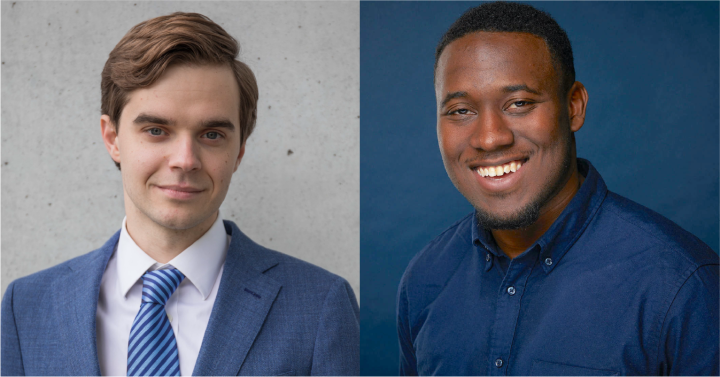Two Ph.D. Students Named 2021 Computing Innovation Fellows
Two University of Maryland graduate students in the Computational Linguistics and Information Processing (CLIP) Lab are a part of the latest cohort of Computing Innovation (CI) Fellows, a prestigious postdoctoral research program managed by the Computing Research Association.
Denis Peskov (left in photo) and Kianté Brantley (right) will join 67 other graduate students nationwide in receiving a CI Fellows award—a two-year paid postdoctoral computing position.
Supported by the National Science Foundation, the CI Fellows program aids recent and soon-to-be Ph.D. computing graduates whose job search was hampered by COVID-19 and its continued disruption on academic job hiring practices and the economy.
CI Fellows receive a $75K annual stipend, work with a computing innovation mentor from another institution, and participate in cohort activities that support career development and community building.
Brantley, who is set to complete his doctoral degree in computer science in December, will go to Cornell University to design ranking algorithms with Thorsten Joachims, a professor of computer science and information science. They will study theoretical and practical aspects of learning-to-rank recommendation system problems, then propose methodologies with theoretical guarantees and practical benefits for sequential decision-making in the recommendation system.
As a researcher in the CLIP Lab, Brantley designs algorithms that efficiently integrate domain knowledge into sequential decision-making problems. He is advised by Hal Daumé III, a professor of computer science with appointments in the University of Maryland Institute for Advanced Computer Studies (UMIACS) and the Language Science Center (LSC).
“Kianté is the sort of student who you can drop in any situation and he’ll find a way to learn from others and make progress on hard problems,” says Daumé. “Plus, people want to work with him—he’s smart, diligent, and also a pleasure to interact with.”
Last year, Brantley was awarded the competitive Microsoft Research Research Dissertation Grant. He also won second place for his talk at the Natural Language and Speech Symposium, the field’s leading conference.
Peskov, who is also expected to complete his doctoral degree in computer science this December, will go on to Princeton University to work with Brandon Stewart, an assistant professor of sociology.
Stewart and Peskov will apply natural language processing tools to better understand organizational decision making, analyze communication from a variety of organizational domains, and create general tools for interdisciplinary work.
Peskov’s research lies in leveraging domain experts to create meaningful and accurate datasets for question answering, machine translation and computational social science. He is advised by associate professor of computer science Jordan Boyd-Graber.
“Denis works on creating the fuel to power artificial intelligence—new and interesting datasets,” says Boyd-Graber, who holds appointments in UMIACS and LSC along with Duamé.
Boyd-Graber describes Peskov as an apostle for quantitative methods because he uses machine learning methods to address real-world problems, and help software makers better communicate how their machine learning products operate.
In 2019, Peskov was awarded the German Academic Exchange Service scholarship by Germany’s largest international educational exchange program, similar to the prestigious Fulbright U.S. Student Program.
UMD is also hosting two incoming CI Fellows from other universities.
Troi Williams, a Ph.D. candidate from the University of South Florida, will be working with assistant professor of computer science Pratap Tokekar on integrating state-dependent sensor measurement models and risk-aware planning.
They aim to develop a novel active perception and planning framework for multi-robot teams that balances computation time and model prediction accuracy, enabling the team to dynamically alter its behavior depending on the current or future situation.
After graduating from the University of California, Los Angeles, Jieyu Zhao will work with Dúame to better understand and intervene on societal biases in natural language processing. Her research is about understanding the societal biases in existing machine learning models, and proposing corresponding methods to intervene on models’ behaviors to reduce those biases.
—Story by Maria Herd
The Department welcomes comments, suggestions and corrections. Send email to editor [-at-] cs [dot] umd [dot] edu.
